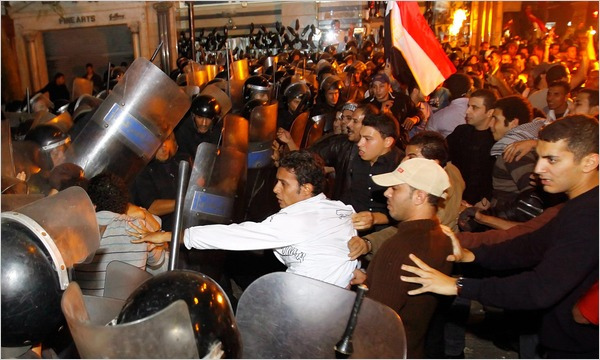Podcast: Play in new window | Download
Subscribe: RSS

What do the Egyptian people want? Islam? Democracy? Or is it just bread, and a way to survive? (Photo by Jerry Jackson, globaltechfirm/Flickr)
Disregard anything the poets and pundits are saying about current events in Egypt as long as they are rhapsodizing about such irrelevancies as democracy vs. tyranny, secularism vs. radical Islam, or when a coup is not a coup. Listen only to those who recognize that Egypt is being sledge-hammered by a perfect storm of peak oil, peak food and peak water, exacerbated by a strong dose of climate change. Egypt is a failing state, whose failure not only will destabilize an entire region, but foreshadows the similar failure of every state whose existence depends on cheap and plentiful oil, food and water.
[Not coincidentally, the first chapters of my book Brace for Impact explain the strains leading to the inevitable failure of oil, food and water supplies in the United States.]
Egypt’s fall has been spectacular. As recently as the 1990s, it was growing all its own food, drilling all its own oil, had plenty of water and enjoyed abundant wealth from selling its surplus oil to the rest of the world. Like almost all oil-rich nations, Egypt used part of its oil revenue to subsidize the cost to its people of energy and food, selling fuel and bread to the masses at well below cost.
The first cracks in Egypt’s foundation appeared in 1996, when oil production peaked at about 935,000 barrels per day. It is informative to study what happened when Egypt reached peak oil: nothing. If anyone realized it, they didn’t say so, and business as usual proceeded. Indeed, it took years for the fact of peak oil to become clear; production was on a plateau, with some years better than the previous year, but with the overall decline steady and immutable. The graph of Egyptian oil production between 1996 and 2010 looks very much like the graph of world oil production since 2005; an undulating plateau, trending downward.
There was no decline, meanwhile, in demand. Supplying the domestic market — gasoline consumption in Egypt doubled in just ten years — took a larger and larger portion of the oil produced, while the maintenance of subsidies took a larger and larger share of the declining oil revenue from foreign sales. The government began to borrow money to cover the spread, because to allow the consumer cost of energy to rise significantly was simply unthinkable. In 2009, Egypt did not produce enough oil to meet domestic demand. Nor would it, ever again.
Then there was the matter of peak food. The increasing real cost of fuel meant a corresponding increase in the real (which is to say unsubsidized) cost of wheat, the staple grain of Egypt. From 2010 on, severe droughts affected the wheat-growing regions not only of Egypt, but of Russia, the United States and China. By then, the country that once grew its own wheat had to import 70 per cent of its needs. The price of wheat doubled in 2010, just as the beleaguered government decreased some food subsidies and imposed rationing. Widespread rioting ensued.
In February of 2011, Hosni Mubarak, ruler of Egypt for 29 years, was overthrown by a popular uprising that he could not put down. According to contemporary media coverage, such as in the New York Times, it was all about young people yearning for democracy. If they could only vote, all would be well.
So they voted. And the only group of people outside of the army who possessed a shadow of a national organization, the Muslim Brotherhood, won. (Contrary to poets and pundits, the possession of a Twitter hashtag is not sufficient to organize a country or win a revolution.) Its candidate Mohammed Morsi won a narrow victory over Mubarak’s long-time prime minister. Meanwhile, most of the powers of his office and of the legislature had been appropriated by the military council that had ruled under Mubarak, ruled between Mubarak and Morsi, and rules today.
The problems Morsi and the army faced now included peak money: In 2011, the country had a balance of payments deficit of over $18 billion; by the end of 2012, the country owed more than $5 billion (half of that past due) for oil it had bought; food and energy subsidies were costing $18 billion a year, a quarter of the country’s entire annual budget.
When the people of Egypt found that democracy provided no more gasoline and bread than autocracy, they cheered the formerly hated army when it booted Morsi out of office and arrested him just a year after his historic election. The country’s democrats and Islamists joined forces to protest; the army began doing what armies do, killing thousands and arresting tens of thousands in the name of maintaining order.
Yet no one: no Islamist, army officer, minister, democrat or tyrant, has found a way to grow more wheat, or drill more oil, or find more water. That is why Egypt will become a failed state while its people scream their arguments about politics and religion. Its fate awaits others.
-0-
[I am indebted to Nafeez Mossaddeq Ahmed for his outstanding piece in the Atlantic, “How Resource Shortages Sparked Egypt’s Months-Long Crisis.”]
I continue to be amazed how with all the media outlets out there stories like this are consistently misreported. Are there no journalists left out there? If anyone in the the so-called mainstream media would report the real story, then perhaps we could all become aware of these problems and their real and long term impact. I know I sound like a broken record (I guess CD in these times), but it is stunning.